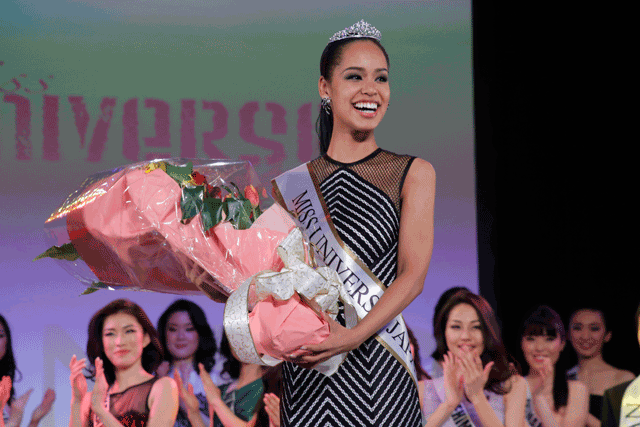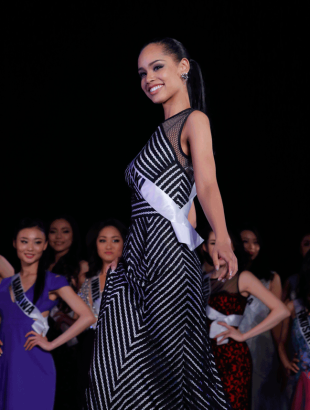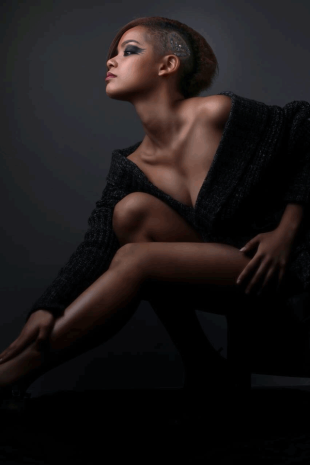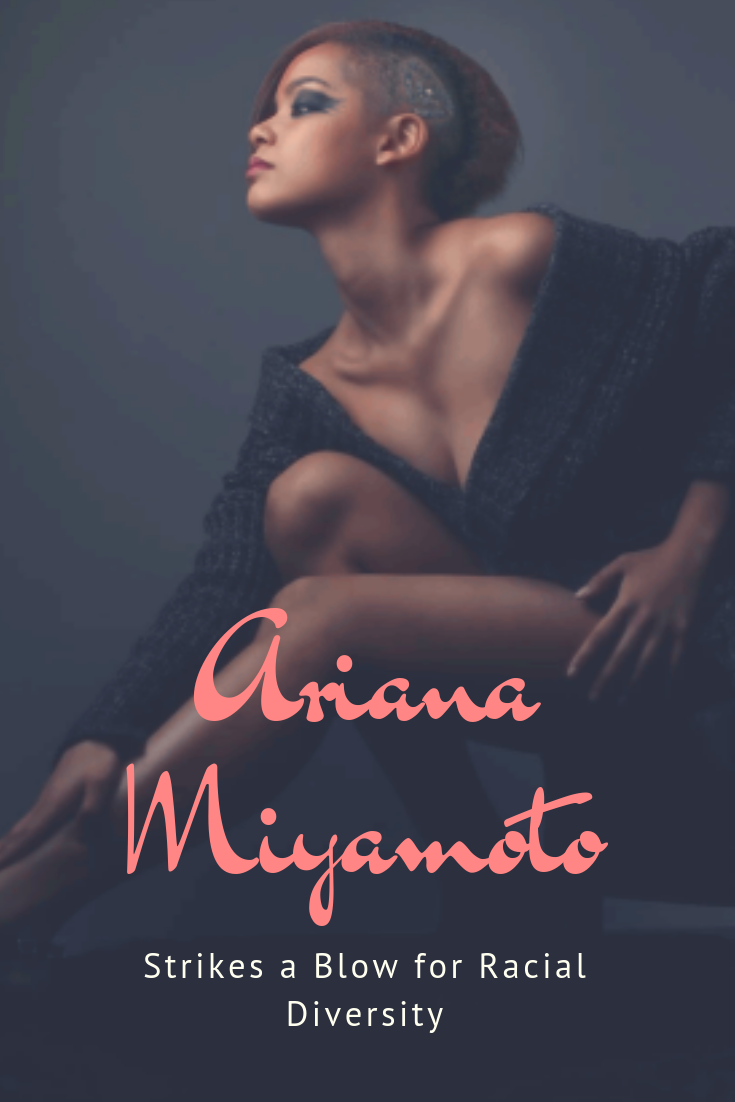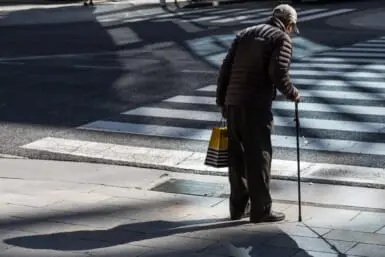Miss Japan 2015 shows the world a new face of the island nation
In 2005 former Prime Minister Taro Aso described Japan as having “one nation, one civilization, one language, one culture and one race.” It was a controversial statement that was widely condemned, yet ten years on, despite the popularity of biracial celebrities like Christel Takigawa, Rola and Becky, it seems that many people still feel the same way.
The recent crowning of Ariana Miyamoto—the first ever mixed-race Miss Universe Japan—has been hailed in some quarters as “a huge step forward” in regard to cultural diversity in one of the world’s most homogenous countries. Since the announcement, the 20-year-old, whose father is African-American, has received thousands of messages of support from around the world; however, there’s also been a lot of criticism.
When I show her picture to people here the first reaction tends to be, “it’s not right, she isn’t Japanese.” Even when I tell them she was born and raised in Nagasaki, has a Japanese mother, feels Japanese and speaks the language fluently, there’s still skepticism because in their eyes she “doesn’t look Japanese enough.” These aren’t responses from extreme nationalists, but ordinary members of the public. Many have shared similar views on social networking sites, with one observer saying, “she has too much black blood in her to be Japanese.”
“The reaction’s been mixed,” Miyamoto tells Weekender from the CJ Building in Shimbashi, Tokyo. “I’ve received nice messages from abroad, particularly Korea and France, which has been great, but in Japan it’s been half and half, excuse the pun (laughs). I’m not bothered about hostile remarks—it’s exactly what I was expecting. I didn’t go into this competition with my eyes closed. I know Japanese people are often viewed as being nice and polite, but that doesn’t mean there aren’t race issues here. Racism exists in this country just as it does all over the world.”
Like Nina Davuluri, who was called “a terrorist” after becoming the first Indian-American to win Miss America, Miyamoto has taken the negativity in her stride. There’s no anger or resentment in her voice when she speaks. Smiling throughout the interview, she comes across as an extremely bubbly young girl who fully appreciates the opportunity she’s been given. Behind the broad grin, though, you can hear the resolve in her voice. She’s determined to use this competition to get her message across.
“I want to help people who are being bullied because of their skin color,” she says. “That’s what happened to me at school. Sometimes it was verbal, with kids calling me kuronbou (a derogatory term for a dark-skinned person) or nigger; other times it got physical, either in the toilets or the classroom where the board eraser would be thrown at me. Of course it upset me, but it also made me stronger.”
Frustrated with life in Japan and wanting to learn more about her father’s country, Miyamoto moved to the States during her mid-teens to study at high school. Despite not speaking English well, she says life was “carefree.” Back in Japan she worked as a bartender and model before being invited to represent Nagasaki in the Miss Universe contest. She turned the original offer down because she didn’t think a mixed-race person like her could win—then a personal tragedy changed her mind.
“My friend committed suicide,” she says. “He was half Japanese like me, but from a Caucasian background. We were really close, often calling each other. He felt he never fit in anywhere. Japanese people didn’t accept him and because he didn’t speak English he wasn’t like a foreigner. For his sake I want to use this competition to help bring about a shift in attitudes in Japan.”
For many people in this country the word hafu—which is said to have emerged in the seventies following the success of the mixed ethnicity group, “Golden Half”—conjures up images of exotic-looking, bilingual celebrities living the high life. The reality for most is very different, as highlighted in “Hafu,” a 2013 documentary focusing on the day-to-day lives of five people raised in a bicultural environment. Directors Megumi Nishikura and Lara Perez Takagi made the movie because they felt “the voices of mixed-race individuals needed to he heard.” Following Miyamoto’s triumph, it would appear that more people are now listening.
“With time greater acceptance of half-Japanese will take place and the crowning of Ariana Miyamoto is a step in that direction,” Nishikura tells Weekender. “There are approximately 20,000 mixed-heritage children born in this country annually, so it’s inevitable that we will eventually become more active in Japanese society. Mixed-race celebrities have been making giant strides in the entertainment industry for a while now and I hope we’ll see something similar happening in industries such as business and politics in the near future.”
“Significant change is still a long way off, but things appear to be getting better,” continues Takagi. “I recently saw mixed-race celebrities on Sanma-san’s TV show talking about their experiences. Things like that and the crowning of Ariana Miyamoto can help raise awareness. To be honest I was surprised to hear she was the first multiracial winner, given the fact that the entertainment industry is overflowing with mixed-race individuals.”
From TV stars such as Erika Sawajiri and Eiji Wentz to models like the Michibata sisters, mixed-race celebrities certainly appear to be in vogue these days. As Miyamoto points out, though, most have Caucasian or Latin American roots, with few sharing a similar background to her.
The reason for this, according to internationally acclaimed playwright, Velina Hasu Houston, is Japan’s general preference for “lightness over darkness.” Describing Miyamoto’s coronation as one of “the most progressive sociopolitical steps that Japan has made in its modern history,” she believes “less brouhaha” would have been made if the Nagasaki-born beauty had “been part white instead of part African American.”
“Saira Kunikada, a Japanese-Italian, was selected by Isetan to represent and be ‘the perfect symbol’ of its ‘This is Japan’ motto. So she can be the perfect symbol, but not a Japanese/African-American woman? Racism permeates the entertainment industry to the extent that blackness is not valued in the same way as whiteness. Ms. Miyamoto’s success may inspire other Japanese to broaden their thinking, but I think it’ll be a very slow process.
“As a mixed race Nikkei [member of the Japanese diaspora] born in Japan, I’m heartened by the fact that this country is in one small way trying to behave globally beyond economics and the military. As for the negative comments, people often do it because social media gives them anonymity. They are rather prosaic and predictable, not to mention lacking in intellectual rigor—she should just ignore them.”
It’s a view shared by Nishikura and Takagi, who both feel too much has been made of the “negative backlash,” and not enough on the “positive aspects,” of Miyamoto’s victory. Miyako Miyazaki, who represented Japan in 2003, says that unfavorable feedback is simply par for the course in the Miss Universe competition.
“It happens every year,” she tells us. “Why did so-and-so win? Her nose is too big; hair is too short, she doesn’t look Japanese enough. I got it as well. With Ariana being half-Japanese it’s been magnified this year, but she can handle it. She’s really strong-willed with a big heart.”
Miyazaki is currently mentoring Miyamoto on how to walk, pose and respond to questions. She finished fourth runner-up herself twelve years ago and believes Miyamoto could finish even higher.
“She has a chance,” says Miyazaki. “She lights up the room with her energy and positivity. Her youthful exuberance is her biggest strength, but it’s also her biggest weakness because she can be a little immature at times and careless with regards to small details. We have a long time until the competition so we can iron those things out.”
Hoping to emulate Akiko Kojima (1959) and Riyo Mori (2007) by becoming the third Japanese lady to be crowned Miss Universe, Miyamoto is full of confidence as she prepares for her long journey to the finals. Victory would be sweet, but even more important is that she conveys her message to the world. This is her chance to speak for her deceased friend and all the mixed-race people in Japan that feel they don’t belong. She’s determined not to let them down.
The following are a few reactions to Miyamoto’s Miss Universe selection from some of her fellow celebrities
LiLiCo
I think she is so beautiful!!
When I saw her on TV I got really excited because I could feel what she’s been through in her life and I felt so much in common.
May J.
I was so happy to hear that this year’s Miss Universe Japan is our first “hafu”!
I am so proud of you and you deserve that crown!
Go hafu!
Crystal Kay
(via Twitter) @CKAY26: YOU GO GIRL???? I’m proud of Japan… Slowly but surely ?????? #achangeiscomin #asiandontraisin…

